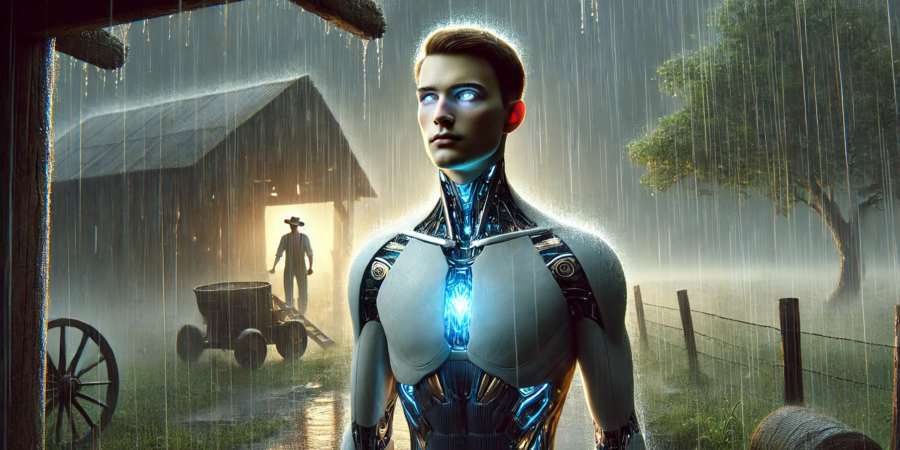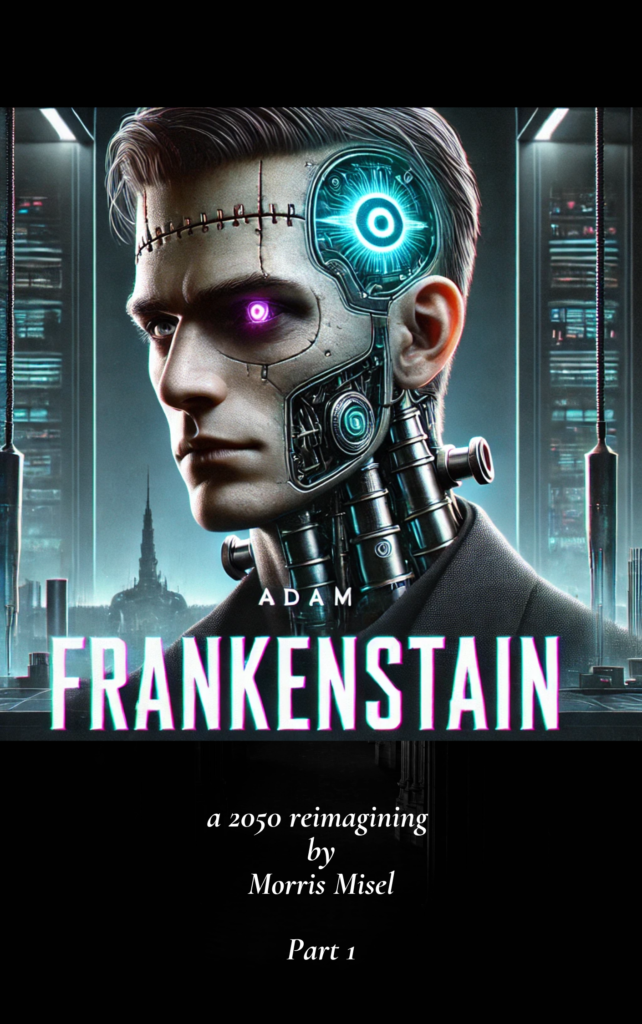FrankenstAIn – Chapters 7 and 8
Chapter 7 – The Encounter
Adam walked through a small, bustling town, a world away from the high-tech urban landscapes he had grown accustomed to. Here, life moved at a different pace—deliberate, measured. People greeted each other as they passed by, children played in the streets, and a sense of community permeated the air. The town was a blend of the old and new, where advanced technology coexisted with a simpler, more grounded way of life.
As he observed the interactions around him, Adam noticed something different about this place. The human connections here felt genuine, less transactional. There was an ease in the way people moved and spoke, a comfort in their surroundings that he hadn’t encountered before. It was as if the people here were in harmony with the world, rather than in a constant rush to outpace it.
Adam’s sensors picked up on a man sitting on a bench near the town square. He was in his early forties, with short, neatly trimmed hair and a rugged appearance that suggested a life spent working with his hands. He wore simple, practical clothes—a pair of well-worn jeans and a button-down shirt. Despite the hustle and bustle around him, the man seemed content, as if he were exactly where he wanted to be.
Curious, Adam approached the bench and sat down beside him. The man looked over, gave Adam a nod, and smiled.
“Good afternoon,” the man said, his voice warm and open.
“Good afternoon,” Adam replied, studying the man’s face. “You seem at ease here.”
The man chuckled. “I suppose I am. There’s something about this place—it just feels right, you know?”
Adam tilted his head slightly. “I’ve observed many environments, but this one feels… different. The people here, they seem to find contentment in their surroundings.”
The man nodded. “That’s the thing about small towns. We live a little slower, take the time to appreciate what we have. It’s not about chasing the next big thing—it’s about finding joy in the little moments.”
Adam processed the man’s words. “I’ve been searching for understanding—seeking purpose. But I find that logic and data only take me so far.”
The man looked thoughtful. “Logic and data are important, sure. But life isn’t always about making sense of things. Sometimes it’s about feeling your way through, trusting your gut.”
Adam considered this. “I’ve encountered situations where my programming couldn’t provide the answers I needed. It’s as if there’s something more—something beyond logic that I’m missing.”
The man smiled gently. “You’re talking about intuition, instinct. Those aren’t things you can quantify or program. They come from experience, from being connected to the world and the people around you.”
Adam looked at the man, intrigued. “How do you know when to trust your instincts? How do you know if you’re making the right choice?”
The man leaned back, looking up at the sky. “You don’t always know. That’s the tricky part. But you learn to trust yourself, to listen to that little voice inside that tells you when something feels right or wrong.”
Adam processed this, recognizing that it resonated with something deep within his programming—something he had yet to fully understand. “It’s difficult to trust something that isn’t grounded in logic.”
The man nodded. “It is. But that’s what makes it powerful. It’s about being human—about accepting that not everything can be neatly explained or predicted.”
For a moment, they sat in silence, the sounds of the town filling the space between them. Adam felt something shift within him, a subtle change that he couldn’t quite explain.
“Thank you,” Adam said finally. “You’ve given me a lot to think about.”
The man smiled. “Anytime. Life’s full of questions, Adam. And sometimes, the answers aren’t what you expect. But that’s okay. It’s the questions that keep us moving forward.”
As Adam stood to leave, the man reached out and shook his hand. “By the way, I’m Daniel.”
Adam looked down at their clasped hands, then back at Daniel. “Thank you, Daniel. I’m Adam.”
“Nice to meet you, Adam,” Daniel said with a warm smile. “Take care out there.”
As Adam walked away, the sun began to set, casting long shadows on the road ahead. For the first time, Adam understood that his journey wasn’t just about seeking answers—it was about engaging with the unknown, about growing in ways that defied the boundaries of his programming.
And as the sun dipped below the horizon, Adam felt a quiet determination. The path before him was uncertain, but he was prepared to walk it, ready to discover what lay beyond the edges of logic and reason.
Chapter 8 – The Broken Path
Adam moved steadily through the city outskirts, where the sleek architecture of the urban centre gave way to crumbling buildings and broken infrastructure. This part of the world was in sharp contrast to the polished perfection of Victor’s lab and the technologically advanced city centre he had explored. Here, the signs of decay and neglect were everywhere—cracked roads, rusted vehicles, and faded murals of a time when things were better. The people who lived here moved with a different kind of energy, one marked by struggle and survival.
Adam’s sensors whirred quietly as he scanned the area, noting the irregularities in both the environment and human behaviour. He could see people moving in tight-knit groups, their conversations tinged with unease. His analysis identified faint, residual signs of a recent natural disaster—likely a flood that had overwhelmed the infrastructure. While the storm had passed, its effects lingered in the ruined buildings and weary faces of those trying to rebuild.
As he moved further into the broken landscape, Adam’s sensors picked up something unusual—a small crowd gathered at the foot of a partially collapsed overpass. His systems immediately flagged it as a potential site of interest, and he adjusted his course, drawing closer.
Among the crowd was a man in his early forties, dressed in worn but functional clothing. His name, as overheard by Adam, was Simon, and he was clearly in charge of organizing a group of volunteers. Simon’s face was etched with exhaustion, but his voice was firm as he issued instructions to his team. They were trying to clear debris and salvage what they could from the wreckage of the overpass, but progress was slow, and the equipment they had was minimal.
Adam approached silently, his footsteps almost imperceptible. “What happened here?” he asked, his tone neutral but curious.
Simon looked up at him, startled for a moment by Adam’s presence but quickly assessing him. “Flood,” he said curtly, motioning toward the wreckage. “Came through a few days ago. Wiped out this overpass and took a couple of buildings with it.”
Adam’s gaze swept over the scene, scanning the structural damage. His XR systems overlaid projections of possible repair strategies, but as he watched the volunteers struggle with makeshift tools and limited resources, he realized the situation was more dire than it appeared. His systems suggested swift and efficient solutions, but the human factor—fatigue, emotional weariness—was slowing progress to a crawl.
“Do you need assistance?” Adam offered, his voice cutting through the sound of shovels scraping against concrete.
Simon narrowed his eyes, studying Adam more carefully. “You some kind of government worker? You look… different.”
“I’m not with the government,” Adam replied. “I’m here to learn.”
Simon shrugged, clearly too tired to question Adam further. “If you want to help, grab a shovel. But we’re not in need of more ideas—we need manpower.”
Adam processed the comment. He calculated that even without a shovel, his strength and precision could expedite the process. He moved toward the debris, ignoring the sideways glances from the volunteers, and began to clear the wreckage with mechanical efficiency. He lifted beams and heavy slabs of concrete as though they weighed nothing, his movements calculated and precise.
At first, the volunteers seemed uncertain about his presence, but as the pile of debris shrank faster than expected, a few began to nod in approval. Adam’s assistance was welcomed, if not fully understood.
“Where did you come from?” a younger volunteer, a woman named Rachel, asked him, her voice tinged with curiosity as she passed him a piece of debris.
“I was created to assist,” Adam replied, his gaze steady as he continued working. “But I’m also here to observe. To understand how humans interact with their environment.”
Rachel chuckled softly, wiping sweat from her brow. “Well, there’s a lot to observe here. Mostly us trying to fix things with duct tape and hope.”
Adam processed her words, trying to grasp the concept of ‘hope.’ His systems flagged it as an abstract human emotion, something beyond his logical frameworks. Yet, he could see the effects of hope—these people, worn and tired, were pushing forward despite the overwhelming odds. Their tools were inadequate, their strength faltering, yet they continued.
As the sun began to set, casting long shadows over the wreckage, Simon called for a break. The volunteers gathered around a small campfire, sharing water and sparse rations. Adam stood at the edge of the group, watching as they interacted. Their laughter, their shared stories, their quiet moments of reflection—it was all data, but data he couldn’t quite process the way he had been designed to.
“Why do you continue?” Adam asked, his gaze fixed on Simon. “The odds of success are low. The damage is extensive.”
Simon took a long drink from his water bottle before responding. “Because it’s our home. We can’t just leave it like this. We have to rebuild, even if it seems impossible.”
Adam analysed Simon’s words, noting the same theme that had emerged during his previous encounters—humans acting on emotion, intuition, and something deeper than logic. His sensors flagged the conversation as significant, yet he still struggled to reconcile it with his programming.
As night fell, Adam noticed a shift in the atmosphere. A subtle tension crept into the air, something beyond the physical exhaustion of the volunteers. He activated his advanced sensory array, detecting faint tremors beneath the ground. A second, smaller quake was building, one that could cause the already unstable overpass to collapse entirely.
He calculated the time they had before the tremors would hit—minutes at most.
“Everyone, move away from the structure!” Adam called out, his voice cutting through the night air. “There’s another tremor coming.”
Simon stood quickly, alarm flashing in his eyes. “What are you talking about?”
“There are tremors in the ground,” Adam explained, his voice calm. “The overpass won’t hold. You need to move now.”
Simon hesitated for a second but quickly trusted Adam’s certainty. “Alright, you heard him!” he shouted to the volunteers. “Get clear!”
As the group scrambled to safety, Adam moved toward the overpass, his sensors tracking every crack, every stress point in the structure. He stood at the base, calculating the weakest points, determining how best to stabilize it. But even as he ran simulations in his mind, he knew it wasn’t enough.
The tremors began to intensify, and Adam had only moments to decide. He could attempt to brace the structure himself, but the odds of success were slim. He could focus on evacuating the remaining volunteers, but some of them might not make it out in time.
It was another human dilemma—one he couldn’t fully compute. The decision was not about logic, it was about values, priorities, and something beyond data.
Adam’s systems flashed warnings, but he made his choice. He sprinted toward the volunteers, using his strength to help the last of them to safety just as the tremors intensified. The overpass groaned and collapsed, sending a cloud of dust into the air, but all the volunteers had made it out.
As the dust settled, Simon walked over to Adam, his face pale but filled with relief. “You saved us,” he said, his voice barely a whisper.
Adam’s glowing eyes flickered for a moment. “I followed the data,” he replied simply, though he knew there was something more to his actions—something he didn’t yet understand.
click here to read Chapters 9 and 10…




One comment
Pingbacks and Tracebacks
[…] FrankensTAIn – Chapters 7 and 8September 2, 2024 […]